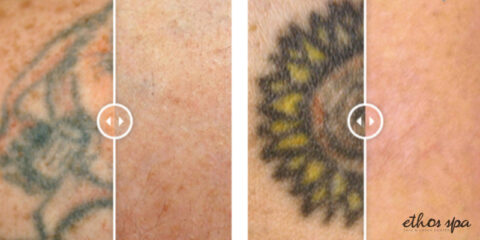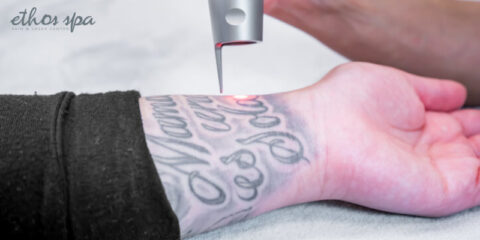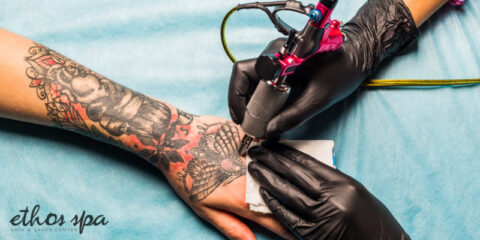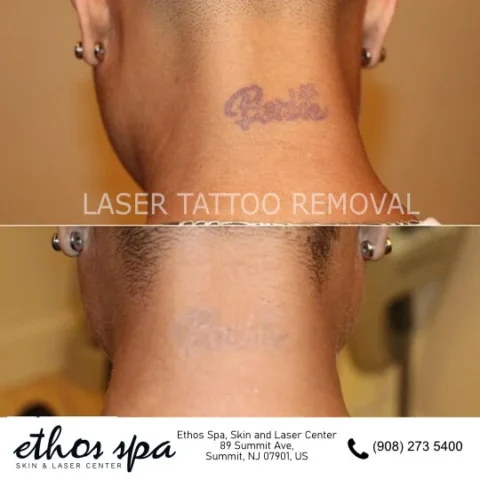Tattoos always seem like a good idea when you get them, but when you change your mind, it isn’t so easy having them removed. Thankfully, laser tattoo removal is a non-invasive process that has been proven to effectively remove and fade away even the most complex tats.
So what are the best ways to improve laser tattoo removal? Here are our top 10 tips:
- Treat your body like a temple
- Avoid the sun
- Stay hydrated
- Stimulate with massage
- Rest after every appointment
- Stay on schedule
- Avoid infection
- Sleep properly
- Stress less
- Follow all aftercare instructions
Read on to understand exactly how laser tattoo removal works and the ideal methods to speed up the process.
How Laser Tattoo Removal Works: Understanding the Process
To understand the ideal ways to speed up the results of your laser treatment, it helps to understand exactly how the removal treatment works. Laser tattoo removal is the only process that has been scientifically-proven to effectively and thoroughly remove tats without damaging the skin, so what makes laser technology so unique?
During laser tattoo removal, doctors use a special type of laser known as Q-switched lasers. These lasers are specifically formulated to emit ultra-short light beams, much shorter than those used in a laser hair removal session. These ultra-short energy pulses are ideal for breaking down the ink in the skin: they last very briefly, no longer than a few nanoseconds.
Why is this important? Because the particles of ink are much smaller than skin cells. Ink particles are just a few nanometers in diameter, meaning very quick and short bursts of energy are required to heat them up and shatter them without damaging the skin. Skin cells are larger than ink particles, so more energy over a longer duration is required for real damage to occur. The Q-switch laser selectively leaves out the skin cells while destroying the particles.
Shattering Tattoo Ink
During the laser removal session, the patient’s tattoo is treated with the beams of laser light. These beams are absorbed by the pigmentation of the ink, which is why skin can be treated without causing harm to the non-tattooed areas, as all the heat is absorbed into the tattoo.
After the ink is shattered, the body needs time to flush out the shattered particles from the area. This is why designs that are closer to your center can be eliminated faster than ink in the extremities, because there is greater blood flow and oxygen flow the closer it is to the body’s core.
Several treatments are required to remove a tattoo, anywhere from 5-10 laser tattoo removal sessions for a complete removal, spaced 5-6 weeks apart. The number of sessions and the long space between each session is required to perform the complete removal safely – you can only shatter a single layer of the tattoo at a time, meaning repeat sessions are required to shatter the deeper layers after the top layers have been flushed out by the body’s natural waste removal systems.
Factors that Influence Tattoo Removal
No two tattoos are the same, not just in the style and design, but also in how they might respond to tattoo removal treatments. Here are the most important initial factors that determine the speed at which lasers can help the fading of your tattoo:
- Tattoo Placement: Tattoo placement plays an important role in how effectively and quickly your tattoo fades away. This is because of how tattoo removal works – the ink is shattered by the heat, and the body has to flush it out afterwards. This means that the closer the tattoo is to your center, the quicker your body can flush the shattered ink particles out. Designs on your extremities (low on your legs or arms) might take longer in fading away than the designs on your chest.
- Tattoo Artist’s Skill: Designs done by skilled and trained professional tattoo artists are more difficult to remove than designs done by amateurs. Professional tattoos generally have more layers and are more deeply embedded in the skin, meaning more layers of ink need to be broken up.
- Tattoo Age: The older your tattoo, the easier will be to remove. This is because ink naturally fades away over time, slowly but surely. Newer ones will have more layers that haven’t been flushed away by the body and need to be removed by the lasers.
- Tattoo Colors: It is important that your clinic has a wide variety of lasers available with various light wavelengths. Different colors respond best to certain wavelengths, and certain colors fade away quicker than others. Black and dark green are easier to remove than colors like purple, yellow, and turquoise.
Top Tips on Improving and Speeding Up the Tattoo Removal Process and Fading

There are many tips you can follow to improve your tattoo removal process, minimizing the overall time to fade away your tattoo. Here are our best tips:
- Treat Your Body Like a Temple: Maximizing your healing process to get rid of the ink means maximizing your immune system, because ultimately it’s your immune system that does all the work through flushing out the shattered particles. This means avoiding all the obvious habits that weaken your immune system – alcohol consumption, smoking, fatty foods – and doubling up on those that strengthen your immune system – lean meats, vegetables, and more.
- Avoid the Sun: You want your skin to be as pale as possible, as this will make it easier for the heat to be absorbed by the particles. Avoid burns, tans, and all kinds of excessive sun exposure every day until your treatments are done.
- Stay Hydrated: Water is key towards helping your immune system and blood flow flush out unwanted substances. The more water in your system, the more easily you can flush away the toxins.
- Stimulate with Massage: A good massage can do wonders for you between sessions, as massages stimulate blood vessels to the treated area. These should be gentle massages, as your treated area will be sensitive between sessions.
- Rest After Every Appointment: While lasers might not be painful, you still need proper rest after every treatment. Make sure to avoid vigorous physical activity for at least 2 days after every treatment.
- Stay on Schedule: Don’t miss your appointments. Letting yourself adapt to the regular schedule will help it more effectively flush away the ink.
- Avoid Infection: Do everything you can to prevent the possibility of infection, as an infection will take you back to square one. Wash your hands, brush your teeth, stay showered and clean, and never eat undercooked food.
- Sleep Properly: Eight hours a night, every day. You need to heal, and most of your healing occurs while you are asleep.
- Stress Less: Are you a person who is regularly stressed out? You’re going to need to figure out methods to ease your stress. The less stress you have, the less cortisol your body produces, and the less cortisol in your system means the healthier your immune system can be.
- Follow All Aftercare Instructions: Your doctor will have specific aftercare instructions relevant to your tattoo, so make sure to follow all instructions.
Laser Tattoo Removal at Ethos Spa and More

Ready to have your tattoo removed by a professional? At Ethos Spa, we are equipped with state-of-the-art high-end laser technology for all your laser treatment needs, whether that may be laser hair removal or laser tattoo removal.
Book your appointment at Ethos Spa today, and finally say goodbye to your unwanted tats!







